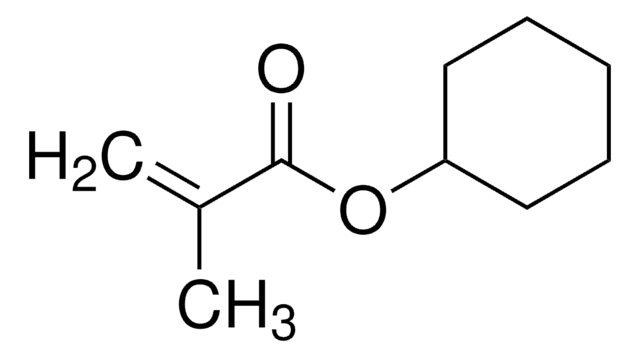191949
Poly(cyclohexyl methacrylate)
average Mw ~65,000 by GPC, powder
Synonym(s):
PCMA
Sign Into View Organizational & Contract Pricing
All Photos(1)
About This Item
Linear Formula:
(C10H16O2)n
CAS Number:
MDL number:
UNSPSC Code:
12162002
PubChem Substance ID:
NACRES:
NA.23
Recommended Products
form
powder
Quality Level
mol wt
average Mw ~65,000 by GPC
refractive index
n20/D 1.5065 (lit.)
transition temp
Tg 104 °C
density
1.1 g/mL at 25 °C (lit.)
SMILES string
CC(=C)C(=O)OC1CCCCC1
General description
The four relaxation process (α,β,γ,δ) of poly(cyclohexyl methacrylate) was studied by investigating its viscoelastic and dielectric properties over a range of temperatures.
Application
Poly(cyclohexyl methacrylate (PCHMA) may be used to prepare polymeric blends with polystyrene and nanocomposites with carbon nanotubes. Densely grafted PCHMA on multiwalled carbon nanotubes (MWCNTs) composites exhibits better mechanical properties and electrical resistance compared to PCHMA blended CNTs composites.
Storage Class Code
11 - Combustible Solids
WGK
WGK 3
Flash Point(F)
Not applicable
Flash Point(C)
Not applicable
Personal Protective Equipment
dust mask type N95 (US), Eyeshields, Gloves
Choose from one of the most recent versions:
Already Own This Product?
Find documentation for the products that you have recently purchased in the Document Library.
Customers Also Viewed
Ultrahigh electrical resistance of poly (cyclohexyl methacrylate)/carbon nanotube composites prepared using surface?initiated polymerization.
Hayashida K and Tanaka H
Advances in Functional Materials, 22(11), 2338-2344 (2012)
Rheological and thermodynamic study of the miscible blend polystyrene/poly (cyclohexyl methacrylate).
Friedrich C, et al.
Polymer, 37(12), 2499-2507 (1996)
Dielectric and mechanical-dynamical studies on poly (cyclohexyl methacrylate).
Ribes-Greus A, et al.
Polymer, 26(12), 1849-1854 (1985)
Articles
Self-assembled monolayers (SAMs) have diverse applications; article compares benefits of alkylthiolates on gold SAM systems.
Our team of scientists has experience in all areas of research including Life Science, Material Science, Chemical Synthesis, Chromatography, Analytical and many others.
Contact Technical Service








